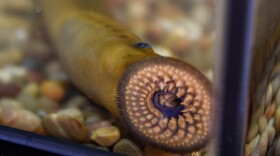In 2022, our podcast "Points North" dove into attempts to mitigate the harm caused by quagga mussels. LISTEN
Filmmakers Yvonne Drebert and Zach Melnick take people to new depths in their documentary “All Too Clear,” using cutting-edge technology to show how these tiny invaders have caused so many problems.
The film is showing this weekend at the Thunder Bay International Film Festival, in Alpena.
"We really wanted to show people life in the Great Lakes, in the world's largest freshwater ecosystem, in a way they hadn't been able to see it before," said co-director Zach Melnick.
The Great Lakes are occupied by quadrillions of quagga mussels that can filter all of Lake Huron's water in one week. Yvonne Drebert is the co-director of "All Too Clear."
"That's just kind of mind blowing," Drebert said. "That's changed how clear our lakes are. They're about three times clearer than they were before the mussels got here. And it's changed how our lakes work, how the life in the lakes live."
Zack Melnick said the mussels are taking algae out of the ecosystem and are changing how that ecosystem works.
"When there's more algae in that water, that gives food for the little bugs that live in the lake, which is food for the little baby fishes, and which are, of course, the food for the bigger fishes that we all love as humans," he said.
Melnick and Drebert worked with a large group of scientists on the film.
"All Too Clear” will show Saturday at 1:00 p.m. in Alpena as part of the Thunder Bay National Marine Sanctuary International Film Festival. Both filmmakers will be in attendance with the robot they used to make the documentary.







